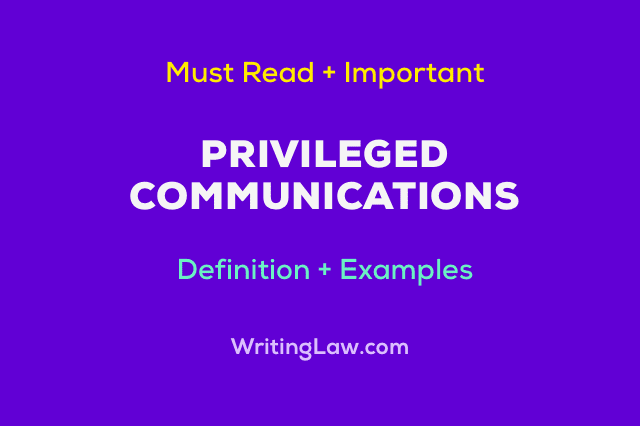
Evidence plays an integral part in a trial as it helps in reaching a conclusion and help deliver a judgement. Evidence can be oral, documentary or in electronic form. A witness can be testified on any event that he has seen or heard.
Certain communications are protected and cannot be adduced as evidence. These are known as privileged communications. Let us learn more.
- What are privileged communications?
- Examples of privileged communications
- Communications during the marriage – Section 122
- Evidence as to affair of state – Section 123
- Official communication – Section 124
- Information as to the commission of offences – Section 125
- Professional communication – Section 126
- Privilege not waived by volunteering evidence – Section 128
- Confidential communication with the legal advisor – Section 129
What are privileged communications?
Privileged legal communications are confidential conversations that a witness cannot be compelled to disclose, even though the communication is related to relevant facts. The court cannot force a witness to disclose such interactions.
Examples of privileged communications
Following are the examples of privileged communications under the Indian Evidence Act, 1872:
1. Communications during the marriage – Section 122
This section bars the husband or wife from disclosing the communication between them during their marriage’s subsistence. But it does not bar the communication to be proved through any other means.
In Ram Bharose vs State of UP, the court affirmed that any communication between husband and wife during the wedlock by the husband to his wife or by his wife to her husband is prevented from being proved in the court of law.
Exceptions to section 122 of the Indian Evidence Act:
- An extra act or conduct can be proved.
- Evidence by a third party can be disclosed.
- Waiver of privilege: A wife may testify against the husband if her husband consents to it or vice versa.
- The suit between husband and wife.
2. Evidence as to affair of state – Section 123
This section prohibits a person from giving a document as evidence that is:
- An unpublished official record, or
- Related to the affairs of the state.
However, it may be given with permission of the concerned department’s head, who may give or withhold such permission.
Section 123 read with section 162 of the Evidence Act – the final authority to decide whether the unpublished document can be adduced as evidence or not rests with the court.
3. Official communication – Section 124
This section prohibits a public officer from disclosing communication made to them in official confidence, where public interest would suffer by its disclosure. In both cases, the public interest is paramount.
4. Information as to the commission of offences – Section 125
This section prohibits magistrates and police officers from disclosing any information received by them regarding the commission of an offence. Similarly, a revenue officer cannot be compelled to reveal any information as to when he got the information regarding the commission of offence related to public revenue.
5. Professional communication – Section 126
This section prohibits barrister, attorney, pleader or vakil from disclosing any information:
- made to him, or
- on behalf of his client, or
- any advice given by him to his client,
in the course and for the purpose of his employment.
Further, it bars the barrister, attorney, pleader or vakil to state the contents or conditions of any document with which he became acquainted in the course or for the purpose of his employment.
Exceptions to section 126 of the Indian Evidence Act:
- Communications made in furtherance of illegal purposes are not protected.
- Any fact observed by the barrister, attorney, pleader or vakil in the course of employment to be fraud or crime being committed since the commencement of employment is not protected.
- A barrister, attorney, pleader or vakil can disclose the communication if the client gives express consent.
Section 127 states that the provisions of section 126 apply to interpleaders, clerks or servants of barristers, attorneys, pleaders or vakil.
6. Privilege not waived by volunteering evidence – Section 128
This section lays down that if there is some secret communication between the client and lawyer and the lawyer appears as a witness, he does not waive the privilege afforded by section 126. But if the client questions the lawyer regarding the secret communication in the court of law, his consent may be deemed to be given.
7. Confidential communication with the legal advisor – Section 129
This section applies where the client is being interrogated. He cannot be compelled to disclose any secret communication between him and his legal advisor unless he offers himself as a witness.
- What Is a Foreign Judgement and When It’s Not Binding in India - 26th July 2022
- What Are Second Appeals Under Civil Law - 23rd June 2022
- Civil Appeal as Per the Civil Procedure Code - 12th June 2022







